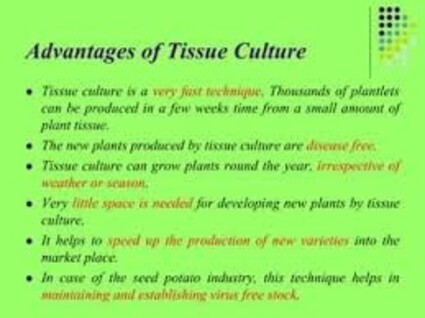Growing Demand for Disease-free and High-Quality Plant Varieties
February 23, 2023

Plant tissue culture is a technique that involves the propagation and manipulation of plant cells, tissues, and organs under controlled laboratory conditions. It is widely used in agriculture, horticulture, and forestry to produce new plant varieties, to propagate plants that are difficult to grow from seeds or cuttings, and to study various aspects of plant growth and development.
In this step, plant tissue samples are collected from a donor plant and sterilized to remove any bacteria or fungi. The tissue samples are then placed on a nutrient medium that contains the necessary nutrients, vitamins, and plant hormones to induce cell division and tissue growth.
The tissue samples are grown in a culture vessel under controlled environmental conditions, such as temperature, light, and humidity. The culture vessel may be a test tube, a petri dish, or a bioreactor depending on the type of tissue being cultured.
Depending on the desired outcome, the tissue samples may be induced to differentiate into specific cell types or organs, such as roots, shoots, or leaves. In some cases, the tissue samples may be used to regenerate whole plants through a process called organogenesis or somatic embryogenesis. Plant tissue culture has several applications in agriculture and horticulture. Some of the benefits of plant tissue culture include: Rapid propagation, tissue culture can be used to produce large numbers of identical plants in a short period of time.
Disease-free plants: Tissue culture can be used to produce plants that are free of diseases, pests, and genetic abnormalities.
Genetic engineering: Tissue culture can be used to transfer genes between different plant species, allowing scientists to produce new plant varieties with desirable traits.
Conservation: Tissue culture can be used to preserve rare and endangered plant species.
Overall, plant tissue culture is a powerful tool that allows scientists and horticulturists to study and manipulate plant growth and development in a controlled environment.
The COVID-19 pandemic has impacted systems and associated livelihoods across the globe due to lockdown, lack of workforce, and restricted transportation. This impacted the value chain from farmer to buyer with the pandemic hitting the market at the time when the harvest activities were starting.
Many workers returned home due to an uncertain work environment and lockdown, causing major losses in the field. Lack of workforce also hindered the production of millions of virus-free tissue culture plants. Restriction on transportation hindered the delivery of planting material, endangering next year's yield.


















Reader Comments(0)